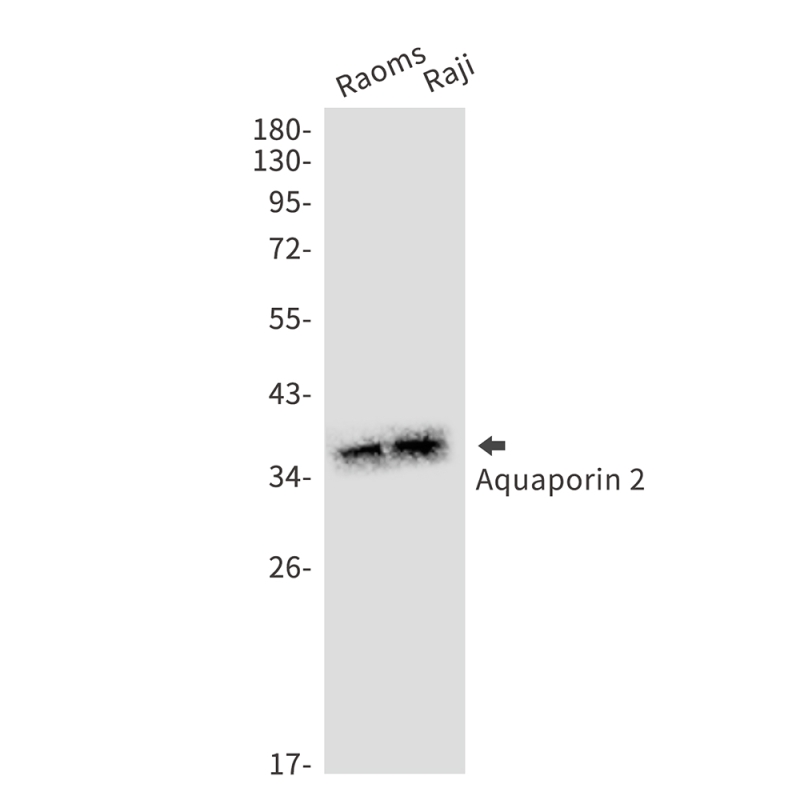
| WB | 咨询技术 | Human,Mouse,Rat |
| IF | 1/20 | Human,Mouse,Rat |
| IHC | 1/50-1/100 | Human,Mouse,Rat |
| ICC | 技术咨询 | Human,Mouse,Rat |
| FCM | 咨询技术 | Human,Mouse,Rat |
| Elisa | 咨询技术 | Human,Mouse,Rat |
| Aliases | AQP-CD; WCH-CD |
| Entrez GeneID | 359 |
| WB Predicted band size | Calculated MW: 29 kDa; Observed MW: 37 kDa |
| Host/Isotype | Rabbit IgG |
| Antibody Type | Primary antibody |
| Storage | Store at 4°C short term. Aliquot and store at -20°C long term. Avoid freeze/thaw cycles. |
| Species Reactivity | Human |
| Immunogen | A synthetic peptide of human Aquaporin 2 |
| Formulation | Purified antibody in TBS with 0.05% sodium azide,0.05%BSA and 50% glycerol. |
+ +
以下是3-4篇关于Aquaporin 2(AQP2)抗体的参考文献及其摘要概括:
1. **"Cloning and expression of apical membrane water channel of rat kidney collecting tubule"**
*作者:Fushimi, K. et al. (1993)*
摘要:该研究首次克隆了AQP2基因,并制备了特异性抗体,证实AQP2在肾脏集合管上皮细胞顶膜表达,调控加压素(vasopressin)诱导的水通透性。
2. **"Vasopressin increases water permeability of kidney collecting duct by inducing translocation of aquaporin-CD water channels to plasma membrane"**
*作者:Nielsen, S. et al. (1995)*
摘要:通过免疫组化和抗体标记,发现加压素通过促进AQP2从细胞内囊泡向顶膜转运,增强集合管对水的重吸收,揭示了AQP2动态调控机制。
3. **"Urinary excretion of aquaporin-2 in water balance disorders"**
*作者:Sasaki, S. et al. (1998)*
摘要:利用AQP2抗体检测尿液外泌体中的AQP2水平,发现肾性尿崩症患者AQP2排泄减少,为疾病诊断提供了生物标志物依据。
4. **"Requirement of human renal water channel aquaporin-2 for vasopressin-dependent concentration of urine"**
*作者:Deen, P.M. et al. (1994)*
摘要:通过抗体免疫印迹和突变分析,证实AQP2基因突变导致常染色体隐性遗传性肾性尿崩症,揭示了AQP2在尿液浓缩中的关键作用。
这些文献涵盖了AQP2抗体的制备、功能研究及临床应用,为理解水代谢疾病机制提供了基础。
Aquaporin 2 (AQP2) is a water channel protein primarily expressed in the principal cells of the renal collecting ducts, where it plays a critical role in regulating water reabsorption and maintaining body fluid homeostasis. Its activity is tightly controlled by the antidiuretic hormone vasopressin (AVP), which triggers AQP2 trafficking to the apical membrane, enabling water permeability and urine concentration. Dysregulation of AQP2 is implicated in disorders of water balance, such as nephrogenic diabetes insipidus (NDI), where genetic mutations or acquired defects impair AQP2 function, leading to excessive urine output and dehydration.
AQP2 antibodies are essential tools for studying the expression, localization, and function of this protein in both physiological and pathological contexts. They are widely used in techniques like immunohistochemistry, Western blotting, and immunofluorescence to assess AQP2 levels in kidney tissues or cell models. In research, these antibodies help elucidate mechanisms underlying AVP signaling, AQP2 phosphorylation, and membrane recycling. Clinically, they aid in diagnosing NDI by detecting reduced or aberrant AQP2 expression in renal biopsies or urinary exosomes. Additionally, AQP2 antibodies contribute to investigating conditions like heart failure, cirrhosis, or syndrome of inappropriate antidiuretic hormone (SIADH), where dysregulated AQP2 contributes to water retention. Their specificity and reliability make them indispensable for advancing understanding of renal physiology and developing targeted therapies for water balance disorders.
×